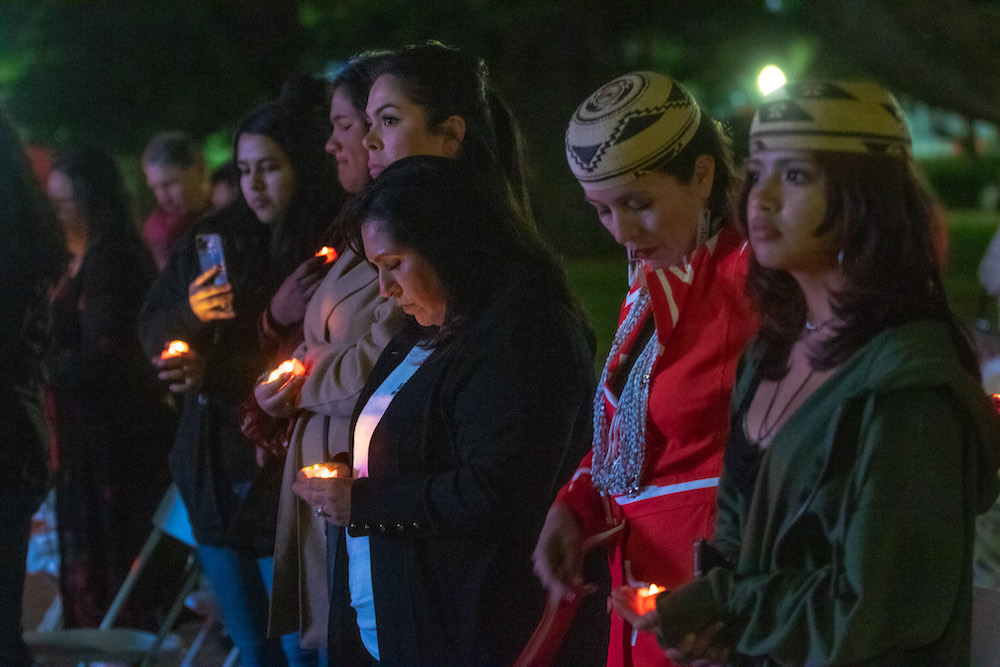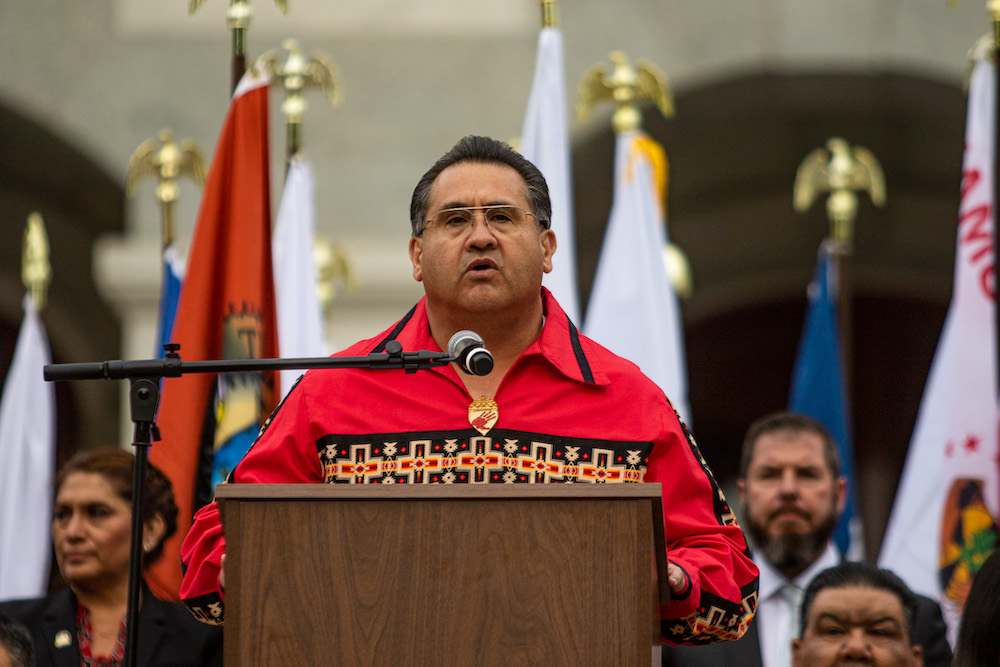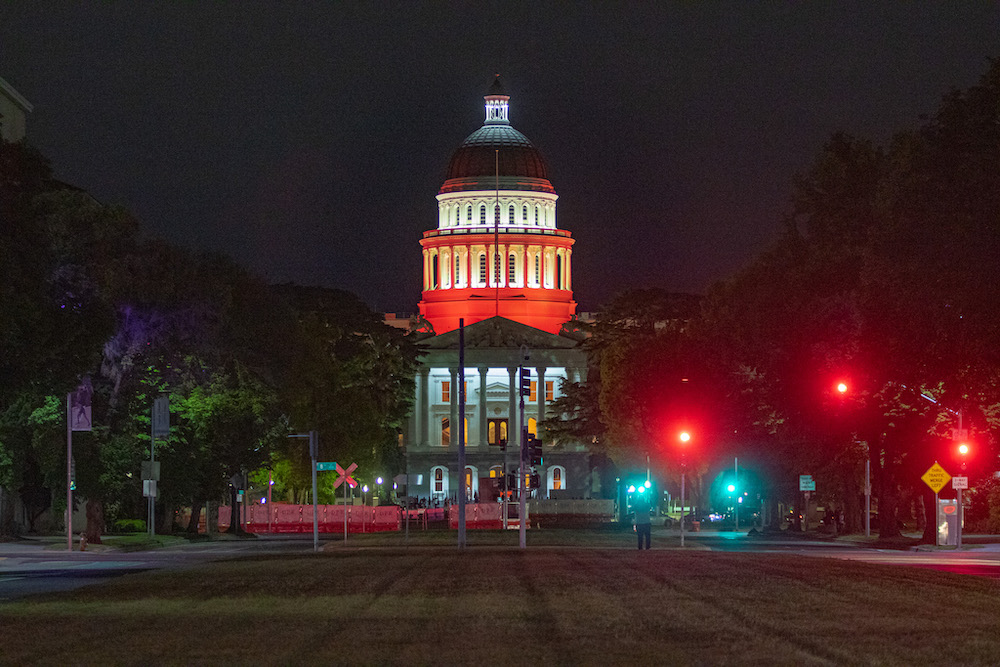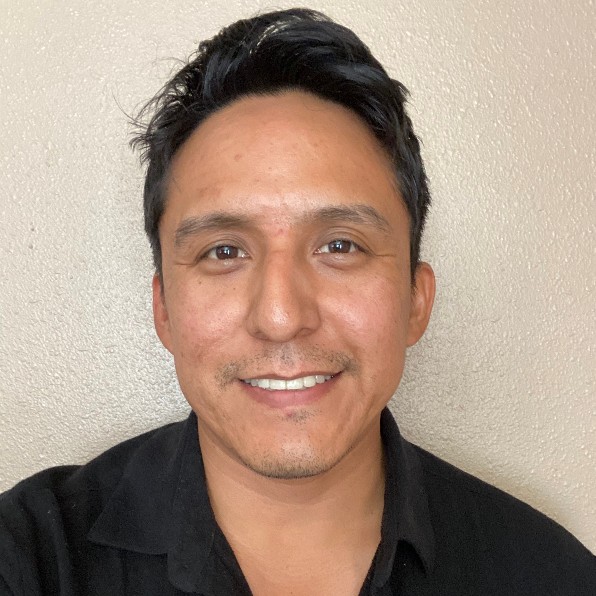
- Details
- By Cyrus Norcross
SACRAMENTO - Nearly 800 people gathered for a candle vigil to honor Missing and Murdered Indigenous People (MMIP) at the California State Capitol on May 3.
The candle vigil was organized by Assemblyman James Ramos in collaboration with tribal leaders, legislators, advocates and family members whose loved ones have gone missing or murdered.
“I want to welcome you to the 2023 inaugural candlelight vigil, at the Capitol here in Sacramento,” Ramos said. “This evening, we will commemorate and remember those, whom. our loved ones, and lost ones that are still out there and those that are still trying to make it home today.
“We’ve been suffering through these different crises as a people for many years. But here in the year 2023, we see alliances being built, awareness being built in the state of California, look around the crowd, the voice of the Indian people is very loud in 2023,” he said.
California has the highest population of Native Americans, approximately 757,628 according to the US Census Bureau. There are 110 federally recognized tribes within California and 81 tribal groups seeking federal recognition.
“Here tonight, we are making the point that there should not be a different brand of justice for Native Americans in the United States and especially in the state of California,” Ramos said.
According to a report conducted by the National Crime Information Center in 2020, there are 9,571 reports of missing indigenous persons nationwide, of which 5,295 are female and 4,276 are male.
“What about those that aren’t on record? Those that we know are still missing within Indian Country, those that we know are larger than the number that’s been recorded,” Ramos said. “Undoubtedly, the real and true figure, we know as indian people, is much higher,”
 Assemblyman, James Ramos, of District 45 speaks to a 800 people in front of the California State Capital about missing and murdered indigenous people on May 3. Ramos is a member of the Serrano/Cahuilla tribe. (Photo: Cyrus Norcross)
Assemblyman, James Ramos, of District 45 speaks to a 800 people in front of the California State Capital about missing and murdered indigenous people on May 3. Ramos is a member of the Serrano/Cahuilla tribe. (Photo: Cyrus Norcross)
FAMILY SEEKS JUSTICE
Allan Olvera, Miwok Tribe, was murdered in his home on October 11, 2001. His family is still seeking justice to this day.
Olvera’s nephew, Matthew Franklin, attended the candlelight vigil to raise awareness and to seek justice for his uncle. Franklin spoke about the day he found out about his uncle's death.
“On that day, our family was doing a traditional Miwok dance in Sacramento, and he was absent. We were looking for him, and his parents went to check on him because he wasn’t answering anybody's phone call,” said Franklin, “That evening, around 8 p.m., my grandparents called telling me that they found him passed away.”
At the time, the murder was unsolved and considered a burglary, since a few of his personal items were stolen. Since the passing of his uncle, Franklin has raised funds for a $50,000 reward to help solve the death of this uncle.
Crystal Martines-Alire, a niece of Olvera, spoke of her uncle at the vigil. “He was so calm and mellow. Very influential in the Native community, and he was a proud Miwok man,” she said, "He was always proud of us doing traditional dancing.“
Olvera was a member of the American Indian Movement (AIM) and participated in the occupation of Alcatraz that happened from Nov 20, 1969 to June 11, 1971. He worked for Sacramento County and was Vice-chair of the Native American Caucus. He was involved with Elk Grove Unified School District’s Indian Education Program, and at his passing a scholarship was created in his name, the Allan Olvera Memorial Scholarship.
“Recently the Sheriff Department in Sacramento has said they identified a suspect and they requested a warrant from the D.A. (district attorney). The Sacramento District Attorney has chosen not to prosecute, and we are looking at all avenues of getting this back in the media to make sure we get justice,” Franklin said, “As Indian people, even here in Sacramento, we still have unsolved case that is at the finish line that we need help with."
“We want our elected officials to stand with us, we count, we are Natives and yet they don’t show up to this event. Where are they?” said Franklin, “We are still waiting for justice for my uncle to this day. In 2023, Native people have to come to beg for justice and that is not right,”
 800 people gathered at the California State Capital for candle light vigil in support of missing and and murdered indigenous people. The capital will be illuminated red from May 1 to May 5. (Photo: Cyrus Norcross)
800 people gathered at the California State Capital for candle light vigil in support of missing and and murdered indigenous people. The capital will be illuminated red from May 1 to May 5. (Photo: Cyrus Norcross)
MMIP INVESTIGATOR
Julie Oliveira, the first dedicated MMIP investigator in California for the Yurok Tribe, was in attendance at the candle vigil. She is a Wyandotte Tribal citizen.
"You can’t just dismiss these folks. That time has passed and it should have never been,” she said, “At least now, people are aware of this crisis and it’s become a national awareness, not just localized.”
The national day of MMIP awareness and events like the one held in Sacramento are helping create visibility for the epidemic beyond Indian Country, according to Oliveira.
“In Humboldt, Del Norte, and all these tribal folks in Round Valley, they already knew this was a crisis. But trying to get someone to notice is hard, this event is letting people know about what is going on,” she said.
Oliveira previously worked with Humboldt County Sheriff's Office for over 25 years and has worked in various positions from school resource officer to patrol deputy. She has conducted missing persons, sexual abuse investigations and is in a leadership position within the United States Office of Violence Against Women’s Task Force. Oliverira has been in her current position for 5 weeks.
“Tribes need more resources for mental health, for drug addiction, and domestic violence issues. The intergenerational trauma that has gone on for decades with tribal members, it’s hard to break that cycle because it has gone on for so long,” she said, “The problem is that it is so rural. Because of ruralness, it makes the situation that much more difficult. There are places on the Yurok Reservation that just got electricity just a few years ago, they have very little cell towers and most people have to drive miles just to get help.”
The Yurok Reservation is located in northwest California, stretching along the Klamath River for 44 miles in the counties of Humboldt and Del Norte.
“We are just starting this (MMIP investigator) program, so we’re still designing this program and would like to be able to present this position to other tribes. So they have the opportunity to do the same thing for themselves,” Oliveria said.
“I'm not dedicated to just working Yurok cases. Allan Olvera is Miwok, and it doesn’t matter because he is an Indigenous person,” Oliveria said. “I’m also doing a Karuk case, a Hoopa case — it doesn’t matter, they are all Indigenous people.”
The event ended with traditional dances from the Yurok Tribe, intertribal bird singers, and Tuolumne Me Wuk dancers while the dome of the California Capital was illuminated red in accordance with missing and murdered Indigenous people week.
“It’s time we all come together as we have seen the culture and heard the speaking take place. Let’s not make this about one day, one night, let’s make this about every day of the year. Making sure our voices are being heard,” Assemblyman Ramos said.
More Stories Like This
Seven Deaths in Indian Country Jails as Inmate Population Rises and Staffing DropsSen. Luján Convenes Experts to Develop Roadmap for Native Maternal Health Solutions
Senate Passes Bill Aimed at Missing and Murdered Indigenous Peoples Crisis
Johns Hopkins Collecting Tribal Success Stories from $1.5B Opioid Settlement
Arizona MMIP Task Force Holds Listening Session for Survivors and Families


